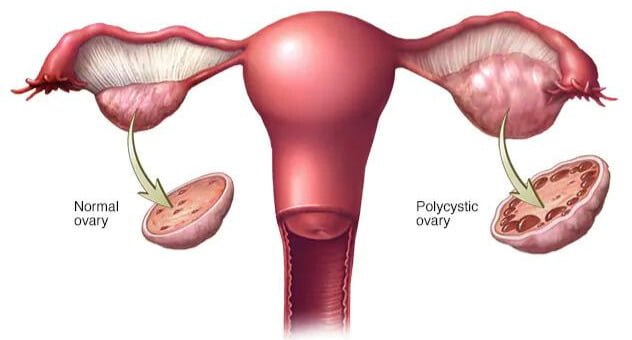Living with Polycystic Ovary Syndrome (PCOS) can present a unique set of challenges, that affect various aspects of a person’s health and well-being. One crucial aspect often overlooked is the hormonal imbalance that accompanies PCOS. Testosterone, a key hormone in both men and women, can be particularly affected in individuals with PCOS. In this blog, we will explore the importance of PCOS and testosterone therapy, shedding light on the potential benefits and considerations of testosterone therapy as a management option.
Contents
Is It Safe To Take Testosterone If You Have PCOS?
 The safety of taking testosterone in individuals with PCOS is a nuanced consideration that should be approached with caution and under the guidance of healthcare professionals. While PCOS is characterized by elevated levels of androgens, including testosterone, the hormonal landscape can vary significantly among individuals. In some cases, women with PCOS may experience symptoms associated with elevated testosterone levels, such as irregular menstrual cycles, hirsutism (excessive hair growth), and acne.
The safety of taking testosterone in individuals with PCOS is a nuanced consideration that should be approached with caution and under the guidance of healthcare professionals. While PCOS is characterized by elevated levels of androgens, including testosterone, the hormonal landscape can vary significantly among individuals. In some cases, women with PCOS may experience symptoms associated with elevated testosterone levels, such as irregular menstrual cycles, hirsutism (excessive hair growth), and acne.
However, not all individuals with PCOS will have elevated testosterone levels, and the syndrome manifests differently in each person. Before considering testosterone therapy for PCOS, it is crucial to undergo a comprehensive evaluation by a healthcare provider specializing in endocrinology or reproductive medicine. Testosterone therapy is not a one-size-fits-all solution and carries potential risks and side effects. The goal is to achieve hormonal balance while minimizing adverse effects.
How Is PCOS And Testosterone Therapy Helpful?
PCOS and testosterone therapy can be beneficial in specific cases. However, it’s essential to recognize that not all individuals with PCOS will require or benefit from testosterone therapy. Here are ways in which testosterone therapy may be helpful for some individuals with PCOS:
- Hormonal Balance: PCOS is characterized by hormonal imbalances, including elevated levels of androgens such as testosterone. Testosterone therapy, when prescribed and monitored by healthcare professionals, aims to restore hormonal balance, potentially alleviating symptoms like irregular menstrual cycles and hirsutism.
- Management of Symptoms: Elevated testosterone levels in PCOS can contribute to symptoms such as excessive hair growth, acne, and male-pattern baldness. Testosterone therapy may help manage these symptoms by regulating androgen levels, leading to improvements in the physical manifestations of PCOS.
- Menstrual Regularity: PCOS often causes irregular menstrual cycles, and some individuals may experience amenorrhea (lack of menstruation). Testosterone therapy, when appropriately prescribed, can contribute to regulating menstrual cycles, promoting more predictable and regular periods.
- Fertility Support: For individuals with PCOS struggling with fertility issues due to irregular ovulation, testosterone therapy may be part of a comprehensive approach to promote regular ovulatory cycles, increasing the chances of conception.
Testosterone therapy should only be prescribed and monitored by healthcare professionals specializing in endocrinology or reproductive medicine. They can assess individual hormone levels, medical history, and symptoms to determine the most appropriate treatment plan for each person with PCOS. Regular monitoring and adjustments to the treatment plan are essential to ensure its safety and effectiveness.
What Is The Process Of Testosterone Therapy For PCOS?
 Testosterone therapy for PCOS (Polycystic Ovary Syndrome) involves a careful and individualized approach, typically managed by healthcare professionals specializing in endocrinology or reproductive medicine. The process may include the following steps:
Testosterone therapy for PCOS (Polycystic Ovary Syndrome) involves a careful and individualized approach, typically managed by healthcare professionals specializing in endocrinology or reproductive medicine. The process may include the following steps:
Comprehensive Evaluation
A healthcare provider will conduct a thorough evaluation, including a detailed medical history, physical examination, and assessment of symptoms. Blood tests will be performed to measure hormone levels, including testosterone. This further helps to determine the extent of hormonal imbalance.
Diagnosis Confirmation
The diagnosis of PCOS is multifaceted and may involve criteria such as irregular menstrual cycles, the presence of ovarian cysts, and elevated androgen levels, including testosterone.
Individualized Treatment Plan
If elevated testosterone levels are identified as a contributing factor to PCOS symptoms, the healthcare provider may consider testosterone therapy as part of an individualized treatment plan. The treatment plan may also address other aspects of PCOS. Such as insulin resistance, which commonly coexists with the condition.
Prescription of Testosterone Therapy
If testosterone therapy is deemed appropriate, the healthcare provider will prescribe the specific form and dosage of testosterone, often in the form of topical gels, patches, or injections. The chosen method will depend on factors such as the severity of symptoms, patient preferences, and potential side effects.
Monitoring and Adjustments
Regular follow-up appointments will be scheduled to monitor the response to testosterone therapy. Blood tests will be repeated to assess hormone levels and ensure the therapy effectively restores hormonal balance. Testosterone dosage or form adjustments may be made based on the individual’s progress and any observed side effects.
Addressing Side Effects and Risks
Testosterone therapy carries potential risks and side effects, including acne, mood changes, and changes in cholesterol levels. Healthcare providers will carefully monitor for these effects and address them as needed.
It’s crucial to note that testosterone therapy is not suitable for everyone with PCOS, and its use should be guided by a healthcare professional based on a thorough assessment of each individual’s unique circumstances. Regular communication with the healthcare provider and adherence to the prescribed treatment plan is essential for a safe and effective outcome.
What Are The Limitations Of PCOS And Testosterone Therapy?
 While testosterone therapy can be beneficial for some individuals with PCOS (Polycystic Ovary Syndrome), it also comes with limitations and considerations. It’s important to recognize these limitations before considering or undergoing testosterone therapy:
While testosterone therapy can be beneficial for some individuals with PCOS (Polycystic Ovary Syndrome), it also comes with limitations and considerations. It’s important to recognize these limitations before considering or undergoing testosterone therapy:
- Not Universally Applicable
Testosterone therapy is not suitable for all individuals with PCOS. PCOS is a heterogeneous condition with varying symptoms and hormone profiles. Some individuals with PCOS may not have elevated testosterone levels, and therefore, testosterone therapy may not be indicated for them.
- Potential Side Effects
Testosterone therapy can have side effects, including acne, mood swings, and changes in cholesterol levels. These side effects need to be carefully monitored, and adjustments to the treatment plan may be necessary to manage them.
- Impact on Fertility
For individuals with PCOS who are trying to conceive, testosterone therapy may not always be the first-line treatment. It’s crucial to consider the impact of testosterone therapy on fertility. Thus, discuss alternative approaches that support ovulation and improve the chances of conception.
- Long-Term Safety Concerns
The long-term safety of testosterone therapy for PCOS is not fully established. More research is needed to understand the potential risks and benefits of prolonged testosterone use in this context.
- Complexity of PCOS
PCOS is a complex condition that often involves multiple hormonal imbalances, including insulin resistance. Testosterone therapy may address one aspect of the hormonal picture but may not be a comprehensive solution for all symptoms associated with PCOS.
- Interaction with Other Medications
Testosterone therapy may interact with other medications or treatments prescribed for PCOS or other conditions. It’s important to inform healthcare providers about all medications being taken to avoid potential complications.
- Requires Ongoing Monitoring
Testosterone therapy requires regular monitoring of hormone levels and overall health. Close supervision by a healthcare professional is necessary. Because it helps to assess the effectiveness of the therapy and address any emerging concerns promptly.
Before considering testosterone therapy for PCOS, individuals should undergo a thorough evaluation by a healthcare provider who specializes in endocrinology or reproductive medicine. The decision to pursue testosterone therapy should be based on a careful consideration of the individual’s specific symptoms, hormone levels, and overall health.
What Is The Success Rate Of Testosterone Therapy?
 The success rate of testosterone therapy for individuals with PCOS can vary significantly depending on the specific goals and symptoms being addressed. Success is often measured by the alleviation of symptoms associated with elevated testosterone levels, such as hirsutism, acne, and irregular menstrual cycles. In cases where these symptoms are directly related to elevated testosterone and androgen levels, testosterone therapy can be quite effective in restoring hormonal balance. Ultimately, improving overall quality of life.
The success rate of testosterone therapy for individuals with PCOS can vary significantly depending on the specific goals and symptoms being addressed. Success is often measured by the alleviation of symptoms associated with elevated testosterone levels, such as hirsutism, acne, and irregular menstrual cycles. In cases where these symptoms are directly related to elevated testosterone and androgen levels, testosterone therapy can be quite effective in restoring hormonal balance. Ultimately, improving overall quality of life.
However, success is not guaranteed for everyone. Thus, individual responses to testosterone therapy can differ based on factors. It’s crucial to note that testosterone therapy is not a cure for PCOS but rather a management strategy to address specific symptoms associated with hormonal imbalances. Success is also contingent on careful monitoring by healthcare professionals, with adjustments made to the treatment plan as needed. Regular follow-up appointments and open communication with the healthcare provider are essential for assessing the ongoing success. And also, for addressing any emerging concerns or side effects.
Conclusion
In conclusion, understanding the intricate relationship between PCOS and testosterone therapy sheds light on a potential avenue for managing the diverse symptoms associated with this condition. While testosterone therapy may offer relief to some individuals by restoring hormonal balance. Still, its success is not universal. The decision to pursue testosterone therapy should be made in consultation with a healthcare professional. They can conduct a thorough evaluation, prescribe personalized treatment plans, and provide ongoing monitoring.
Beyond medical interventions, embracing lifestyle modifications and seeking holistic support contribute to a comprehensive approach to managing PCOS. Each journey is unique. Thus, the path to well-being involves a collaborative effort between individuals and their healthcare providers. If you are facing PCOS-related issues, PCOS treatment at HerMantra can help. Book your free trial online pcos treatment session now.


